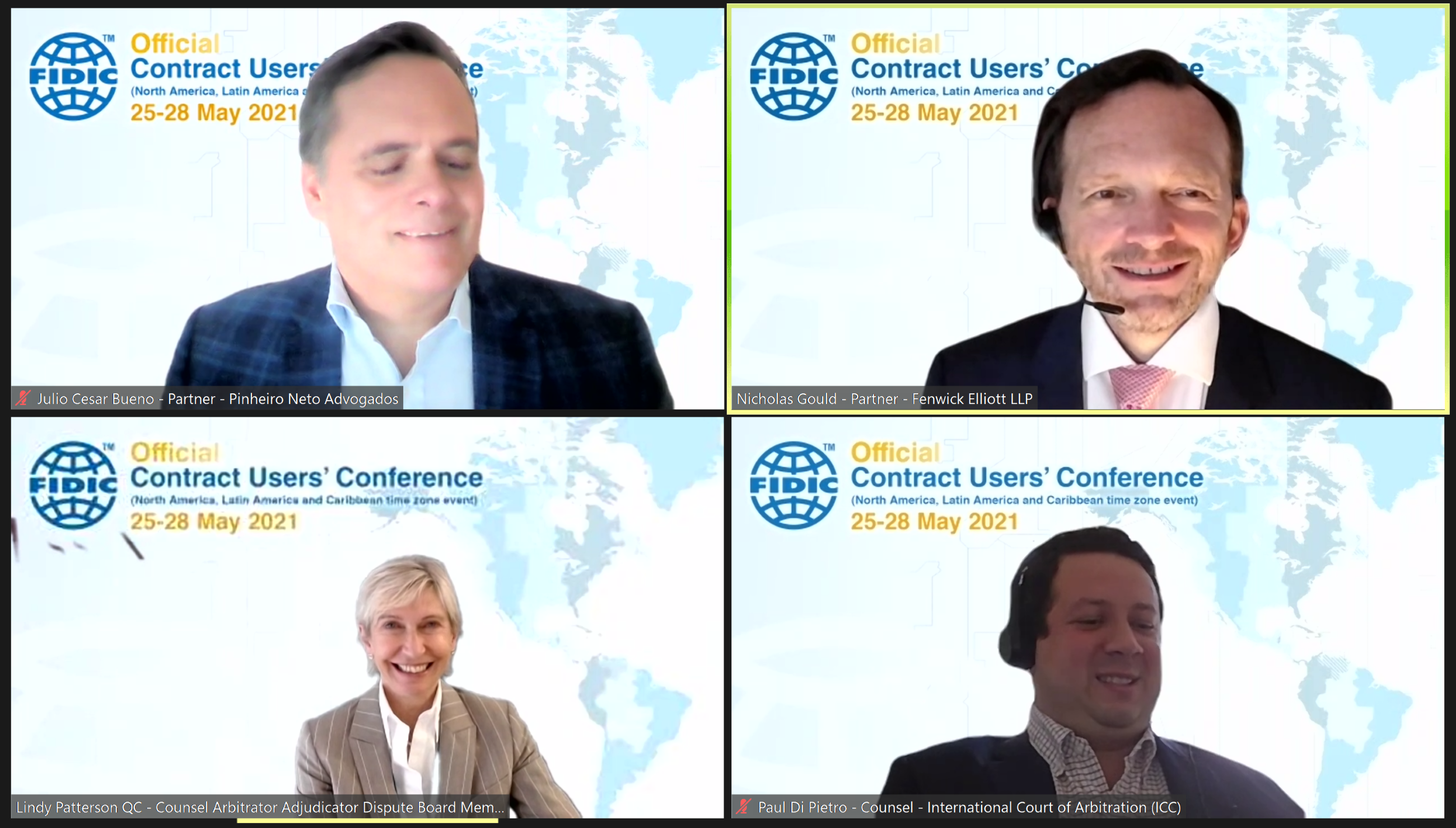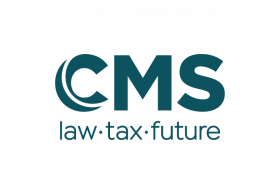The second day of the Official FIDIC Contract Users’ Conference (North America, Latin America and Caribbean time zone event) on 26 May 2021 focused on procurement, consultancy agreements and dispute avoidance and resolution, writes FIDIC communications advisor Andy Walker.
Day two’s theme, for an event delivered online by FIDIC was Getting it right with FIDIC – why procurement matters, consultancy agreements and dispute resolution. The conference, sponsored by FIDIC global strategic partner, international law firm CMS, was opened by FIDIC CEO Dr Nelson Ogunshakin who said he was delighted to see that the conference had attracted participation from MDBs, private sector organisations and clients, government, engineers, contractors, investors, consultants, and other stakeholders who have an interest in FIDIC contracts.
Speaking at the first session of day two, Zoltán Záhonyi, past chair of the FIDIC contracts committee, looked at project procurement and the key aspects to consider in order to achieve successful projects and select the right forms of contracts. “Project preparation is crucial and FIDIC has clear answers to all the choices that professionals can make,” Záhonyi said, as he highlighted the different FIDIC contracts that were suitable for various types of works being undertaken in the construction sector and gave delegates clear guidance on which form of contract to use for what project.
Next to speak was Husni Madi, vice-chair of the FIDIC contracts committee, who spoke about the FIDIC Golden Principles, which set out the essential characteristics of its general conditions of contract that should not be amended if the contract is to be regarded as a genuine FIDIC document. “We see contracts in use that are butchered and mutilated beyond all recognition and this is misleading to the industry as they are not truly FIDIC conditions of contract. This is unacceptable to FIDIC and our answer was to publish the FIDIC Golden Principles,” Madi said.
Urging delegates to download the FIDIC Golden Principles, Madi gave a quick overview of the five principles on the key issues of Division of roles, Drafting, Risk/reward, Time and Disputes. Madi said that each principle expressed a single, readily understood and accepted concept – so simple, he said, “that even my young child can understand it!”
Speaking third in session one was Emma Schaafsma, a partner at international law firm CMS, spoke from her experience as a dispute lawyer, highlighting what sustainable procurement looks like and the optimal balance of risk. “Procurement is not just about price,” Schaafsma said. “It’s about having viable construction supply chains. While recognising that the aim of procurement was to optimise project returns for stakeholders, she said that evidence demonstrates that procurement is key to delivery of a “successful” project and that there was a direct correlation between the procurement method/process, cost overruns and schedule overruns.
Schaafsma highlighted the problem of contractors trying to recover costs by bidding low and then seeking changes and claims thereafter. Clients should be wary of those that bid low, she said. She spoke highly of FIDIC contract forms which had evolved to reflect market practice and seek to allocate risk to the party most able to bear that risk. Of course, this meant that there should be an understanding that parties bearing greater risk should receive greater reward but that is why FIDIC contracts were seen as fair and equitable, said Schaafsma.
The second session of the conference looked at the services outlined in FIDIC contracts and consultancy agreements. Nael Bunni, special advisor to the FIDIC contracts committee, opened the session by speaking about the role of the engineer under FIDIC contracts and highlighted that the 2017 edition of the FIDIC Red and Yellow Books is more prescriptive than the 1999 first edition or its predecessors. He gave an overview of Clause 3 in these contracts which highlighted provisions relevant to the engineer, namely those on the engineer, Engineer’s duties and authority, Engineer’s representative, Delegation by the engineer, Engineer’s instructions, Replacement of the engineer, Agreement or determination and Meetings.
Next up was FIDIC contracts committee member Deryl L. Earsom, who gave an overview of the FIDIC services and consultancy agreements. Earsom, who is also vice president and deputy general counsel for Jacobs Engineering Group, outlined in some detail the structure and main features of the Client/Consultant Model Services Agreement (2017 White Book), Sub-consultancy Agreement (2017), Model Joint Venture (Consortium) Agreement (2017) and the Model Representative Agreement (2013 Purple Book).
Sebastian Hoek, senior partner at Stieglmeier & KollegenQ, talked about the FIDIC White Book and JV Agreements and examined the key topics they contained. He explained that the White Book highlighted a scope of services that was also taking into account market developments such as more management responsibility and less design, new markets like D&B, DBO, ODB, alliancing and partnering. Consultants were having to pay more attention to matters like definition of purpose, assessability of design quality and making it comparable, scoreable, etc and training on interface management. Hoek gave examples of the support available from FIDIC which included guides on procurement procedures and definition of services, training capacities and programmes and of course specific FIDIC contracts. He also highlighted the new FIDIC products in the pipeline like ODB, alliancing/partnering and EPCM.
Julio Cesar Bueno, a partner at Pinheiro Neto Advogados opened the third session on dispute avoidance and effective dispute resolution and introduced Fenwick Elliott partner Nicholas Gould to give the legal perspective on claims, notices and determinations. Gould highlighted the engineer’s determination clause which requires consultation with each party ‘in an endeavour to reach agreement’ and then in the absence of agreement to make a fair determination in accordance with the contract. The engineer is then required to give notice to both parties of each agreement or determination together with supporting particulars and then the parties are bound by any agreement or determination until revised later under Clause 20.
Gould stressed the importance of the contractor keeping contemporary records that may be necessary to substantiate any claim. This was particularly important given that in order to submit a claim there were four key areas that had to be dealt with. These were a detailed description of the event or circumstance giving rise to the claim, a statement of the contractual and/or other legal basis of the claim, all contemporary records on which the claiming party relies and the detailed supporting particulars of the amount of additional payment claimed.
Lindy Patterson QC, counsel, arbitrator and adjudicator at 39 Essex Chambers, spoke next on dispute avoidance and dispute resolution by dispute boards. She regretted that dispute avoidance had not been embraced fully during the pandemic and hoped that this would change as the world emerged from the pandemic. “FIDIC has placed us well in that we have the contracts to do it but we have to have the right mindset to avoid disputes,” said Patterson. More needs to be done to explain what the dispute board can do in terms of dispute avoidance, she said, as this was not explicitly stated in their raison d’etre.
“More engagement with employers and engineers so that they can understand that dispute boards can be beneficial to the project,” was needed said Patterson who stressed that dispute boards should not only be used for disputes, but they were a way of avoiding disputes and this needed to be much more widely understood across the industry and by all parties, she said.
The final speaker in session three was Paul Di Pietro, counsel at the International Court of Arbitration, who looked at the issue of arbitration under FIDIC contracts and outlined some key numbers as far as the international court was concerned. Of 929 new cases registered at the court, 20.8% of caseload are construction disputes, 26% of emergency arbitration applications concern construction and 16% of expedited procedure cases concern construction. Di Pietro highlighted some of the key features of construction arbitration, common procedural issues and some practical recommendations to help industry professionals when dealing with claims.
Summing up the second day of the conference, FIDIC board member Luis Villarroya thanked the attendees and speakers for their contributions. “We have learned lessons on procurement and the importance of selecting the right contract for the right project and highlighted the FIDIC Golden Principles which outline those contract clauses that are untouchable,” he said. Villarroya also spoke about the one of the biggest strengths of FIDIC contracts – namely how they help to avoid disputes. “We have had three great sessions with professional speakers imparting their knowledge. We need to extend the use of FIDIC contracts in the Latin America region and the philosophy they underpin. The high level of infrastructure investment needed in the region can only be helped by the wider use of FIDIC contracts,” Villarroya concluded.








